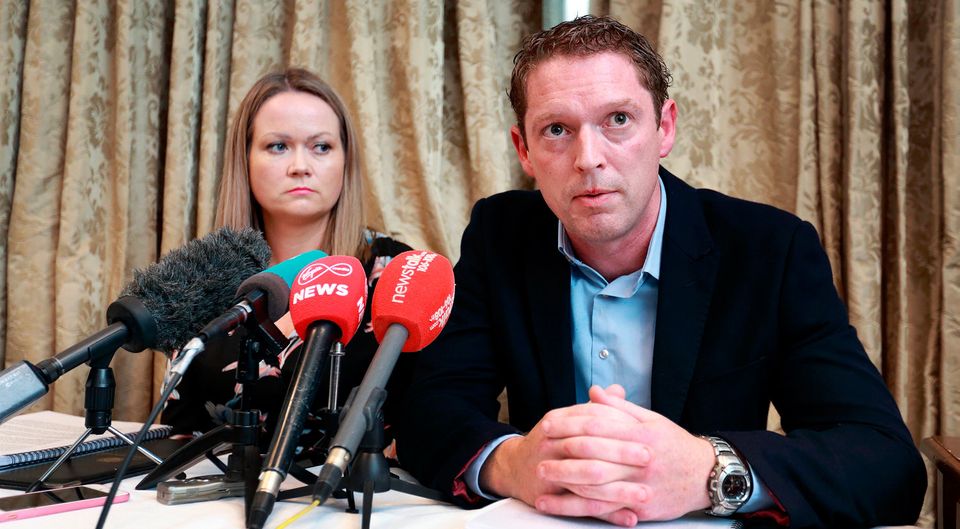'Bordered on misogynism' - doctor behind scathing CervicalCheck scandal report says 'someone should say sorry'
Report found that hurt and distress suffered by women was aggravated by some doctorsDr Scally said the women felt particularly betrayed that doctors kept the audit reports from them170-page report highlights the system-wide failures and found nobody was in charge of CervicalCheck
Dr Gabriel Scally pictured at the briefing. Photo: Frank McGrath
Women battling cancer were subjected to a string of damaging, hurtful and offensive behaviours by some doctors in the cervical cancer scandal.
In his long-awaited report, health expert Dr Gabriel Scally has delivered scathing conclusions on the state of the national cervical cancer screening service.
The author of the new report into the CervicalCheck debacle described it as so poorly run it was “doomed to fail” and said some of the treatment of women “bordered on misogynism”.
The hurt and distress suffered by the 221 women who developed cervical cancer – and the families of 18 victims who died – was aggravated by some doctors.
These doctors passed on much-delayed audit reports telling them for the first time they had got a wrong smear test result.
But one woman who asked her oncologist what open disclosure meant was stonewalled.
Stephen Teeap and Lorraine Walsh pictured speaking at the media briefing on Dr Gabriel Scally’s Report of the Scoping Inquiry into the CervicalCheck Screening Programme, at Buswells Hotel, Dublin. Photo: Frank McGrath
“He ushered me out the door with no support,” she said.
In another case, a woman was left distressed when the doctor who had failed to pass on the audit report showing her test result was incorrect just “sat back in his chair”.
She recalled that his attitude was that he “could not give two hoots”.
One grieving family who lost their mother were horrified to be told: “Nuns don’t get cervical cancer.”
The doctor reminded them that she was a smoker.
Another doctor excused his failure to pass on the audit, saying it "got lost in his file".
A doctor told a patient that he did not tell her because "he did not know the protocol".
Other women remarked that the doctor dealing with them "could not look me in the eye".
When one woman asked her doctor how she would be informed from then on, he said to "watch the news".
A clearly upset patient was shocked that she attended the doctor for years but he remained silent about having her audit report. "So am I just a number?" she wondered.
Dr Scally became emotional as he recalled the testimonies of women who got cervical cancer, but were kept in the dark for years about the audits showing their test results were wrong. "They kept me honest," he said.
He believes there is a tradition of looking at women's health as "secondary". The experiences of the women prompted him to conclude: "paternalism is alive and well".
Dr Scally said the women felt particularly betrayed that doctors kept the audit reports from them. He said: "I would really like someone to say sorry and someone who means it to say sorry."
His conversations with the women were rarely, if ever, short and some were harrowing and emotional.
His 170-page report, which has 50 recommendations, highlights the system-wide failures and found nobody was in charge of CervicalCheck.
"The current policy and practice in relation to open disclosure is deeply contradictory and unsatisfactory," he said.
Open disclosure should involve a patient being told promptly that they were the victim of harm by a health service or doctor.
But currently "there is no compelling requirement on clinicians to disclose" and little guidance even from the Medical Council, the regulatory body which should hold them ethically to account.
Dr Scally said he found no reason why CervicalCheck should not continue using the three labs which currently carry out screening, one in the United States and the other two in Dublin.
The strongly worded report and the manner in which it delved into the failures in CervicalCheck was welcomed by several of the victims.
Vicky Phelan, the Limerick mother of two whose High Court case uncovered the presence of the secret audits, said she felt "vindicated" by the report.
But she echoed the call by Stephen Teap, the Cork father of two young boys who lost his wife Irene to cervical cancer, that the recommendations must not be left to gather dust.
Health Minister Simon Harris said failure to disclose the audit findings to the victims amounted to a "breach of trust". He said the attempt to release the audits to victims was "botched".
Dr Scally found that the medical advisory committee of CervicalCheck only met once in the last 10 years.
For every 1,000 women screened, around 20 women will have pre-cancerous changes. The traditional cervical test will identify some 15 of these women.
The HPV test, which will be introduced next year, will pick up 18, according to the report.
Responding to the Scally report, the Royal College of Physicians of Ireland said it would take time to "fully consider" those recommendations which will inform medical training and education programmes.
Join the Irish Independent WhatsApp channel
Stay up to date with all the latest news
















